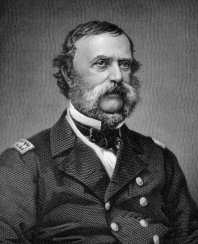Collecting Delaware Books
Admiral Samuel Francis du Pont 1803-1865
First published December 1995

An interesting collection of letters by a Delaware figure is the 3-volume Samuel Francis Du Pont, A Selection from His Civil War Letters edited by John D. Hayes, himself a retired admiral and published by Cornell University Press in 1969. A related book is Rear-Admiral Samuel Francis Du Pont, United States Navy by Henry A. du Pont and published by the National Americana Society, New York, in 1926.
Du Pont was born in Bergen Point, New Jersey, before his family achieved the wealth and fame it would gain from making gunpowder on the Brandywine. However, before his majority, he became a Delawarean and his family became influential enough to get appointments for him as either a West Point cadet or a navy midshipman. "Frank" chose the navy and served with distinction for more than 40 years.
During the Mexican War in 1845, he was responsible for blockading the west coast of Mexico. Just before the Civil War, he commanded America's first twin-screw steam warship on a diplomatic mission to China.
He is best known for his Civil War commands. During the early part of the war, he was involved with building up the navy — building new ships as well as converting civilian vessels to wartime use. Later he blockaded the southern coast. His success was due in part to his logistic arrangements including provisions for coaling the blockading ships.
Finally, he was ordered to capture Charleston with a naval force of poorly built and unproven ironclads. The attack was a failure, and du Pont was unfairly blamed. He died a few years later.
The Letters
The three volumes of letters are titled The Mission 1860-1861, The Blockade 1862-1863, and The Repulse 1863-1865.
Some of the early letters show the heated emotions the Civil War engendered. Du Pont speaks bitterly of officers, once friends, who chose to join the rebel cause. He refers to them as traitors to their military oath.
His letters regarding the ill-conceived invasion of Charleston are detailed and direct. They show a great deal about the workings of the political and naval establishment. His letter to Secretary of the Navy Gideon Wells protesting written criticism for the invasion's failure are quoted in part here.
"I was silent respecting its harsh language and unjust reproaches, trusting with confidence that when the facts were recalled to its recollection, the Department would retract the wounding words it had written, but which it could never expunge from its records.
"In this I have been painfully disappointed. It is with profound regret I perceive in your dispatch of the 16th June a reiteration of the charges and reproaches of previous dispatches, and in your silence since, during a period of three months, a resolution not to recall them. My last hope of justice at the hands of the Department is therefore extinguished.
"If I have failed in my duty I am liable to trial, but insulting imputations in official dispatches are grave wrongs, perpetuated in the public records to my permanent injury.
"The remedy which law would allow me against a superior officer indulging in language of your dispatches does not exist against the civil head of the Department. It only remains therefore for me to place again on the records of the Department my indignant refutation of its renewed charges."
Though the connection of these letters with Delaware is only their author's residence, they make interesting reading for anyone interested in the Civil War.
Update 2006
There is an interesting sidelight with a Wilmington connection. In 1882, Congress authorized a statue honoring du Pont. It was created by well-known sculpture Launt Thompson and erected in 1884 at what is now known as Dupont Circle in Washington DC. (Today it is a historic district and Metro stop.) In 1922, the du Pont family had the statue replaced by a "more artistic" fountain with allegorical figures. The original statue was moved to Wilmington and now stands at the 19th St. and Tower Rd. entrance to Rockford Park.